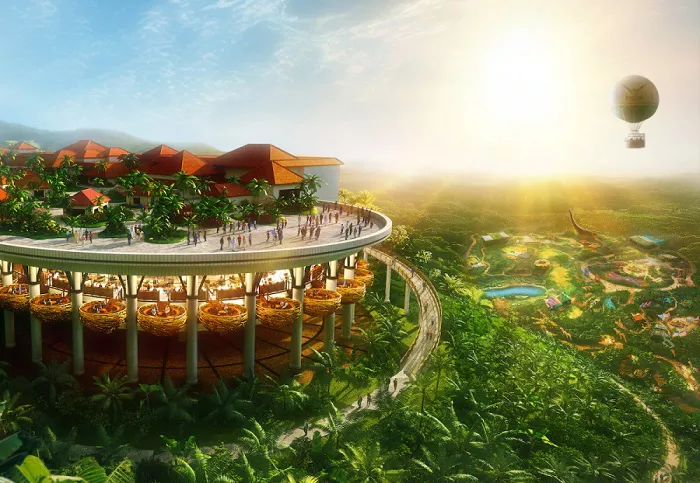TOKYO (Reuters) — A new nature-themed adventure park set to open in Okinawa is banking on Japan’s surging tourism industry to fuel its launch and propel broader ambitions across Asia.
Spanning 60 hectares on the site of a former golf course, Junglia will feature over 20 attractions including a hot air balloon ride, treetop walking trails, off-road buggies, and a “Dinosaur Safari.” The park is scheduled to open its doors on July 25, backed by a ¥70 billion ($634 million) investment.
The project is led by Tsuyoshi Morioka, CEO of entertainment firm Katana and a prominent figure in Japan’s theme park sector. Morioka is known for revitalizing Universal Studios Japan (USJ) in Osaka through the introduction of Harry Potter-themed experiences, which significantly boosted attendance.
Japan is currently witnessing a historic tourism boom, driven in part by a weaker yen. The number of international visitors soared 47% in 2023 to a record 36.9 million, while tourism spending surged 53% to ¥8.1 trillion ($55.6 billion), positioning it as the nation’s second-largest export sector after automobiles.
Theme parks have long held appeal among Japanese consumers, with Tokyo Disney resorts and USJ enjoying sustained popularity. However, the sector is not without challenges, as several parks have faced closures over the years.
Yu Shioji, chairman of the Amusement Park Society of Japan, expressed skepticism about Junglia’s prospects, citing competition from similar attractions and relatively high ticket prices—¥6,930 ($48) for domestic visitors and ¥8,800 ($60) for international guests.
Despite the hurdles, Morioka remains optimistic. Citing proprietary financial models, he estimates a more than 70% chance of success. He anticipates several thousand daily visitors and believes the park can be profitable with just half the attendance of the Okinawa Churaumi Aquarium, which draws around 3 million visitors annually.
Morioka argues that demand for high-value tourism experiences in Japan will persist, especially as neighboring Asian economies become wealthier. “The weak yen is a tailwind, but the number of people who want to visit Japan will increase structurally regardless of the currency effect,” he said.
The Japanese government has set a goal of attracting 60 million overseas tourists annually by 2030. Should Junglia prove successful, Morioka envisions scaling the concept through smaller, sub-¥100 billion developments in markets such as Taiwan and Indonesia.
He also hinted at the possibility of listing Katana to finance future growth and expressed interest in developing attractions based on Japanese anime, contingent on securing intellectual property licenses.
“There should be a third global option after Disney and Universal,” Morioka said. “I want to create a new category of theme parks originating from Japan, targeting areas those giants can’t reach.”

